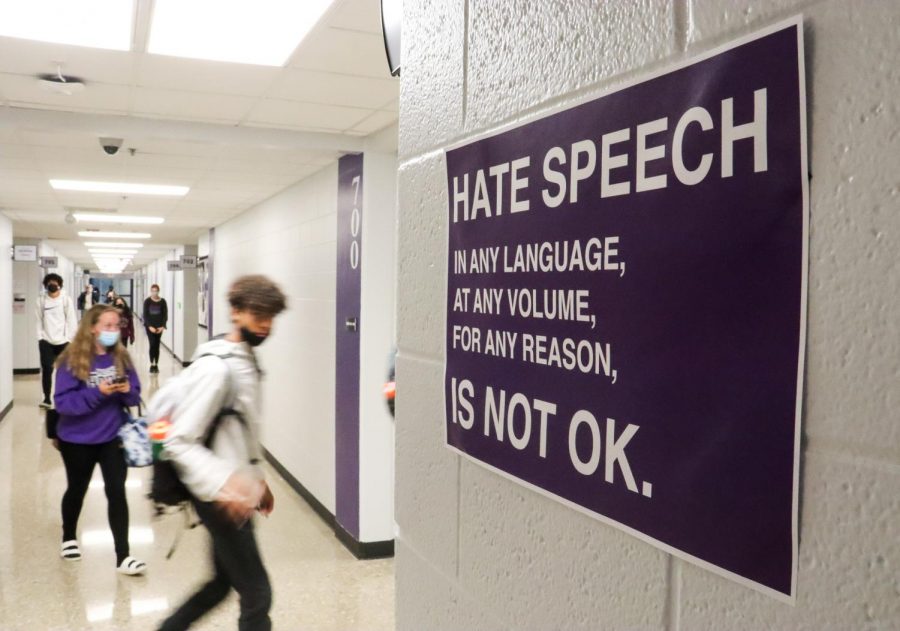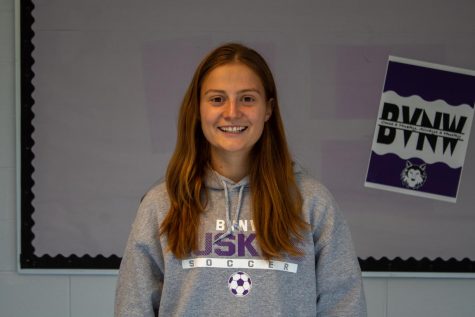Bathroom racial slur prompts teachers to take action
Teachers addressed an incident of hate speech with their classes and colleagues
A sign addressing hate speech is posted outside a classroom door in response to a racial slur in a male restroom, Oct. 28.
October 28, 2021
A student discovered Monday a racially charged slur etched on a stall in the 200 hallway boys bathroom, posted it to social media, and after seeing it on social media, another student made a teacher aware of the situation.
It was reported to the administration soon after, resulting in the immediate closure of the bathroom.
English teacher Kyle Farrington sent an email to the entire Northwest staff last night, encouraging the faculty to talk about the harm of hate speech.
“I wanted to tell other teachers how I wanted to act on it and invite them to do the same, so we could get enough critical mass moving in a positive direction,” Farrington said.
He sent the email because he said he was concerned about how the community would feel if the racial slur was not addressed with students.
“It scared me a little bit because if we didn’t talk about it, if kids were not allowed to talk about it, then we would become complicit in that vandalism,” Farrington said. “Kids and staff members who felt like it was directed at them, [I was worried] that those people wouldn’t feel supported by the staff and community.”
Principal Amy Pressly confirmed the incident. Farrington said he could not speak to how administration is handling the incident, as he is unaware of all of the steps included in this process.
“Administration has a lot of rules and laws they have to follow,” Farrington said. “I am sure they have reasons for handling it the way that they did, and I do not know any of those things.”
In response to Farrington’s email, a group of teachers came together this morning to collaborate on an email to send to the Northwest staff, highlighting ways to help staff members talk about incidents of hate and racism with their students.
This group of teachers meets each Sunday via zoom to discuss issues of race, and reads books and listen to podcasts on how to end racism, according to English teacher Dan Eigenberg. He, along with math teacher Kerry Kinkelaar, broadcast teacher Kim White, special education teacher Robin Hodges, English teacher Amanda Ford, English teacher Amanda Witty, science teacher Sarah Derks, math teacher Carolyn Potter and principles of engineering teacher Karen Stohlmann signed their names to the bottom of this email.
Eigenberg, who found out about this incident from Farrington’s email, said he spoke to his fourth-hour freshman honors English class and said he addressed the talking points from today’s email.
“[I did not] ambiguously address [what] has happened, [I] addressed that hate speech and hate language has no place at Northwest,” Eigenberg said.
Additionally, Eigenberg said his class discussed the importance of making sure this issue will not emerge again.
“Hearing, seeing and reading something [like this] makes everybody in our community vulnerable, everybody in our community less safe,” Eigenberg said. “We ended up having a conversation about the importance of everyone acting as a community to make sure this was an isolated incident and not something that is endemic of the student body or the culture here at Northwest.”
Pressly said the teachers’ emails were sent on account of students not taking this issue seriously.
“They were encouraging their fellow teachers to talk to students about it because to my understanding with talking to teachers is kids were laughing and joking about it, and that is what the teachers were upset about,” Pressly said.
In addition, Pressly said she knows teachers are upset for not being made aware of the situation and said she addressed it with them in a faculty meeting after school.
As for why the issue was not addressed with teachers earlier, Pressly said it is because issues such as these are not normal at Northwest.
“We deal with discipline, we do not normally deal with discipline in that way,” Pressly said. “We [talked] to [the] teachers this afternoon and probably are going to change the way we do things.”
Ultimately, Farrington and Eigenberg said they want to cultivate a supportive community, free of hate speech.
“I, like every other teacher here, loves the kids who go to school here,” Farrington said. “I want to teach in a building where students know they will be respected and cared for, and I want all staff members to feel that way as well.”







